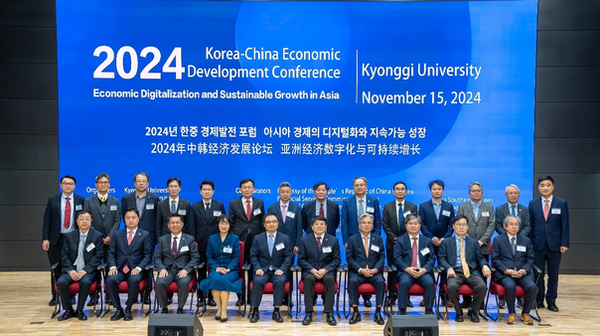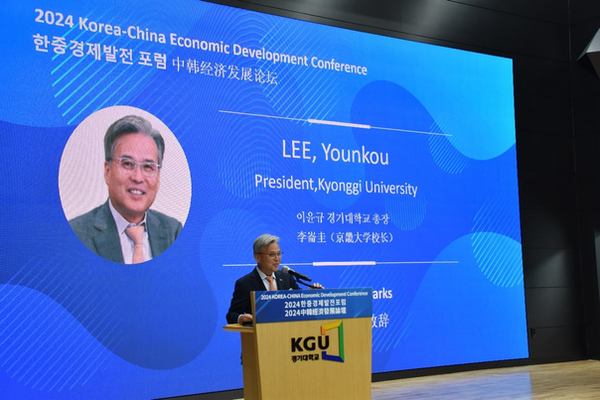JDIEG
JOURNAL
Journal of Digital Intelligence and Economic Growth
Print ISSN: 3058-3535
Online ISSN: 3058-6518
Journal Co-hosts the China-Korea Economic Development Conference: Economic Digitalization and Sustainable Growth in Asia
On November 15, 2024, the China-Korea Economic Development Conference, themed "Economic Digitalization and Sustainable Growth in Asia," was successfully held at Suwon Campus of Kyonggi University in Korea. The conference was co-organized by Peking University、Kyonggi University、China Council for the Promotion of International Trade and the Korea Institute of Finance. It was hosted by the Korea-China Economic Development Research Institute、Journal of Digital Intelligence and Economic Growth 、IEFS、and ICNKR. As a driving force of the new wave of technological and industrial transformation, the digital economy has emerged as a key engine of global economic growth. Despite the complex and volatile international trade environment in recent years, economic and trade cooperation between China and Korea has remained robust, supported by favorable policies and advancements in digital technologies. This conference focused on how digital intelligence can propel economic growth, addressing strategies for achieving sustainable development in the current international landscape while enhancing regional cooperation and global competitiveness.



Group Photo of Conference Guests
On November 15, 2024, the China-Korea Economic Development Conference, themed "Economic Digitalization and Sustainable Growth in Asia," was successfully held at Suwon Campus of Kyonggi University in Korea. The conference was co-organized by Peking University、Kyonggi University、China Council for the Promotion of International Trade and the Korea Institute of Finance. It was hosted by the Korea-China Economic Development Research Institute、Journal of Digital Intelligence and Economic Growth 、IEFS、and ICNKR. As a driving force of the new wave of technological and industrial transformation, the digital economy has emerged as a key engine of global economic growth. Despite the complex and volatile international trade environment in recent years, economic and trade cooperation between China and Korea has remained robust, supported by favorable policies and advancements in digital technologies. This conference focused on how digital intelligence can propel economic growth, addressing strategies for achieving sustainable development in the current international landscape while enhancing regional cooperation and global competitiveness.

Address by LEE Younkou, President of Kyonggi University

Address by Dong Zhiyong, Vice President of Peking University and Dean of the School of Economics
In the keynote session, Professor LEE Keun from Seoul National University delivered a thought-provoking speech on "The Development and Transformation of Contemporary Korean Capitalism." He argued that modern Korean capitalism is increasingly aligning with the Anglo-American model in terms of economic slowdown, rising inequality, and low unionization rates. However, in areas such as social welfare and labor policies, Korea remains closer to Europe, representing a distinct variant of East Asian capitalism. Professor Goro Takahashi from Aichi University in Japan shared insights on Japan's challenges and opportunities within the framework of digital intelligence and economic growth. He highlighted that artificial intelligence (AI) and digital technologies are reshaping Japan’s economic future. Over the next 20 years, generative AI could unlock up to 148.7 trillion yen (approximately USD 1.1 trillion) in productive capacity, accounting for around 25% of Japan’s GDP. To fully leverage the potential of the digital economy, Japan must address its digital trade deficit, promote international data management and exchange, invest in digital education and research, and establish an international cooperation framework with China, Korea, and India. Strengthening cybersecurity and enacting robust data privacy legislation are also critical for sustainable digital growth. Professor Wang Yuesheng from Peking University’s School of Economics focused on the importance of actively promoting the Digital Economy Partnership Agreement (DEPA). He emphasized that while digital economy and trade have become the primary drivers of global economic growth, significant restrictions and barriers persist in many countries, leading to a fragmented global digital trade governance system. Wang underscored the value of regional digital economy agreements in reducing these barriers and fostering a more unified digital trade environment. He expressed optimism about China’s future accession to DEPA, which he believes will significantly boost regional economic development.

Keynote Speech by Professor LEE Keun from Seoul National University

Keynote Speech by Professor Goro Takahashi from Aichi University

Keynote Speech by Professor Wang Yuesheng from Peking University’s School of Economics
Following the keynote speeches, the conference organized two roundtable discussions, focusing on "Digitalization Strategies for Asian Economies" and "Growth Strategies for Asian Economies." The first roundtable was moderated by Senior Research Fellow SEO Jeongho of the Korea Institute of Finance. It featured Professor Wang Dashu from Peking University, Professor CHOI Sungho from Kyonggi University, Associate Dean and Professor Ma Xufei from the Chinese University of Hong Kong, Senior Research Fellow SUH Byungho from the Korea Institute of Finance, Research Fellow Li Xinping from Peking University’s School of Economics, and Professor Gong Chi from Kyonggi University. The discussion explored the drivers of artificial intelligence development and the importance of regional cooperation from the perspectives of business practices, financial collaboration, and data management. Experts also cautioned against the negative effects of AI, including job displacement, security risks in payment systems, and data misuse. Looking ahead, the participants stressed the need for enhanced data standardization, regional cooperation, technology regulation, and education to promote fairness and sustainability in digital transformation.

Roundtable Discussion 1: Digitalization Strategies for Asian Economies
The second roundtable discussionwas moderated by Professor Zhang Zheng of Peking University’s School of Economics, with participation from Professor JIN Changhyun of Kyonggi University, Professor Qin Xuezheng, Vice Dean of Peking University’s School of Economics, Professor YEO Taekdong from Yeungnam University, Auditor JEON Byungmok from Industrial Bank of Korea, Professor Wu Liang from Beijing Normal University, and Assistant Professor Sun Pin from Renmin University of China. The discussion centered on the potential of the Asian market, covering topics ranging from human resources and digital transformation to regional cooperation. The scholars delved into key directions for the sustained economic development of Asian countries. They emphasized that the integration of education and artificial intelligence is crucial for enhancing competitiveness, while energy cooperation and the expansion of carbon markets will create vast opportunities for regional collaboration. At the same time, they highlighted the need to address the impact of digitalization on employment and social security. In conclusion, Professor Zhang Zheng summarized that economic growth should return to the fundamental logic of production and life, balancing both domestic and external demand. He stressed the importance of advancing urbanization, improving institutions, and achieving sustainable development.

Roundtable Discussion 2: Growth Strategies for Asian Economies
As the editorial office of the Journal of Digital Intelligence and Economic Growth, the Korea-China Economic Development Research Institute, together with the journal, co-hosted the conference, aligning closely with the journal’s mission. The theme of "Economic Digitalization and Sustainable Growth in Asia" is deeply in line with the journal’s focus. The conference invited experts and business representatives from China, Japan, Korea, Hong Kong, and other countries and regions, reflecting a collaborative effort across industries, universities, research institutions, and government sectors. Their insights on sustainable economic development in the current international landscape will provide valuable inspiration for policy-making and academic research in the digital economy. This conference also offers meaningful guidance for the exploration of the journal’s objectives, the exchange of ideas among domestic and international scholars, and the journal's growing global influence. It will contribute to ensuring that the journal continues to make strides in the future, providing a broader research platform and more opportunities for international scholars.